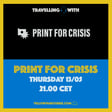Women's Role in Myanmar's Revolution
00:00:17
Speaker
the women's purpose.
00:00:19
Speaker
according to traditional gender roles is to serve your husband and your son and don't talk back to your husband and don't argue with him and don't have opinions, things like that. But things have changed and if you can see in this revolution, women are not only fighting for the political freedom, they're also fighting for equality. In this revolution, to fight for a true democracy where everybody is treated as equal
Introduction to The Yellow Van Stories Podcast
00:00:53
Speaker
Hello and welcome to a new episode of The Yellow Van Stories, your interview podcast taking you across the globe in a yellow French campervan by the name of Fonzie.
00:01:04
Speaker
I'm your host and driver Bastian. Today we come to you with another special episode focusing on the current situation in Myanmar, particularly on the role of women. It is a conversation I have been looking forward to ever since Teza, my guest today, was introduced to me.
00:01:23
Speaker
And ever since the military coup, I've been wondering what I could do from the enormous comfort of my home to show solidarity and support for the courageous Bamese women and men fighting for their freedom.
PrintforCrisis.org Initiative
00:01:35
Speaker
And it turns out there is a way.
00:01:39
Speaker
The initiative PrintforCrisis.org, run by my friends Olga Stefatu and Chiara Luxardo, offers you the opportunity to buy limited edition photo prints of more than 80 internationally acclaimed photographers until the 11th of May. More information about the initiative and how it supports the democratic struggle in Myanmar will follow at the end of this episode.
Women in Myanmar's Democratic Movement
00:02:02
Speaker
Fonzies in first gear ready and we are good to go. So buckle up and get comfortable because today we look into the powerful role women are playing in the Burmese democratic movement and why that is a reason for hope and optimism.
00:02:22
Speaker
Here with us in the yellow van today is Tessa Zoe, a Burmese visual storyteller with a doctorate in photography.
Teza Zoe's Journey and Insights
00:02:30
Speaker
And I am extremely happy to have you on board, Zoe and Tessa. I've been extremely looking forward to our conversation today for the last two weeks already. So welcome aboard. Hi, thank you for inviting me. And I'm really glad to be here and to talk about things that are going on in Myanmar.
00:02:49
Speaker
Yes, absolutely. I spoke to Minh last week, which I thought was very, very, very interesting for me. I took away so much from that about democracy and a bit about that background and now today with you to focus on the role of women in Myanmar and also especially during this democratic movement now. And so we'll get into that right away.
00:03:18
Speaker
after we have dealt with the usual traditional things in this podcast, right? So first off, what do you call yourself to drink? Well, I make myself a virgin mojito.
Cultural Reflections and Myanmar's Tea Culture
00:03:31
Speaker
It's a virgin mojito because I can handle alcohol and I don't want to embarrass myself in the podcast getting drunk.
00:03:45
Speaker
I think I should do that all the time as well. To just, you know, not embarrass myself. So I think I'll take that as a thing for me, for the future as well. And where are you right now? I actually, wait, I have to tell you, I poured myself. I skipped that last week already. I skipped that last week already, I keep doing that. I poured myself because I just read in Myanmar that rum is a very popular drink. Beers are very popular.
00:04:15
Speaker
But you know, then rum is in many other places as well and beer as well. So to get a really proper Burmese beer or rum was kind of impossible for me. So I decided to go with something else, which is a strong black tea. It's not, it's a Darjeeling tea. I know it's also not Burmese, it's the closest thing I could get with a lot of sugar and condensed milk. That's also something that's very popular. Tea shops and you know, some tea shops are really
00:04:42
Speaker
well known and popular for the way they make the tea and you know there are different like variations of it like whether you wanted extra sweet or you know extra tea so yeah well done i'm sure it tastes delicious so i didn't oh thank you thank you oh it is it is absolutely i love it i mean what's you know how can you know sweet tea there's just nothing
00:05:05
Speaker
You can beat the sugar high. No, possibly. Nothing that you can possibly... Exactly. Usually that's also a good thing, you know. Especially also for a podcast interview. So I'm totally ready to go.
Exploring Gender Oppression Through Photography
00:05:24
Speaker
I'm set in my living room.
00:05:27
Speaker
And Manchester. All right. And what's your favorite item? Your favorite item? Oh, at this minute, I will say my virtual retail class. That's very good. Oh, just for me.
00:05:46
Speaker
This is, oh my God, you have been listening before, you know, these podcast interviews can take a long time. So you can't prepare. You can't prepare. That's very good. That's very good. My cup is also quite big. Look, it's not, it's not that small. Yeah, it's okay. It will last a while, a little bit at least. So.
00:06:10
Speaker
Now, usually at this point, I would read a CV that I had, that I have handwritten and handcrafted. Um, today we're going to do it a little differently because after you sent me a link to the thesis, uh, which we're going to be talking about because you have a doctor in photography, which is, uh, something quite extraordinary. You said actually it's a doctor in philosophy, right? Technically, but you did it, uh, with obviously with a focus on photography and the photographic process. Yes.
00:06:42
Speaker
All right. So because I've never really met a doctor in photography, you know, that's that to me is absolutely something entirely new and exciting.
00:06:55
Speaker
I think it's a very good thing. I think it's a very good thing. Also, I mean, you take amazing photos and end having a doctorate. I think it's amazing. So I mean this absolutely praisingly. Also because I believe the topic of your thesis is incredibly interesting and deserves a lot of attention and praise in itself. And because of that, I decided instead of writing something about you to let you introduce yourself a little bit by your preface to the thesis that you wrote.
00:07:24
Speaker
because I think it will give a very good starting point for the conversation we're about to have. So this really mainly goes out to the listeners today because you pretty much know what you wrote in there already. But bear with me, after two non-virgin mojitos, maybe it would be different, but not today. So bear with me while I read this out. And then right after that, we talk about your motivation, where it went from there. Okay, sounds good.
Teza's Academic and Career Transition
00:07:56
Speaker
So you start off with, I left my country, Myanmar, when I was 16 to attend a university in Thailand. The reasons for me to leave home a familiar environment at such a young age to study abroad did not come easy. I vividly remember getting into the biggest argument ever with my parents just after the matriculation examination results came out.
00:08:16
Speaker
I still remember my total score was two points short of the cutoff point for the University of Medicine that year for women. That year the Ministry of Education had decided to raise the entry requirements for girls and reduce the requirement for boys because they felt that there had been too many women and not enough men in the country's most pivoted profession. Up until that point, all my life I was told that the best thing I could achieve or the best profession I could get into as a woman in Myanmar is the medical profession.
00:08:46
Speaker
In that moment, I felt like my whole world had ended as if everything I had worked for the past 11 years counted for nothing. And then I learned that my friend who got a lower score than I did could apply for the medical school, although his total score was 15 points lower than mine, just because the requirements are set much lower for boys. That was the first time in my life I felt so angry for being born as a woman.
00:09:10
Speaker
It wasn't that I had failed. It wasn't that I didn't try hard enough. My only shortcoming was being a woman. My mother reminded me that it's not the first time this has happened and it won't be the last. And I know it happens to many other girls in my country. Our dreams and aspirations are taken away just because we are born female. At 16, with my lifelong dream shattered and with no other viable alternative path, I decided to leave my home.
00:09:39
Speaker
From that point on, my eyes were wide open and I began to notice a lot of things that women in my country are deprived of just because of our gender. This research is the way for me to address and expose the systemic gender oppression in Myanmar culture and how religion is used to justify gender inequality by evoking traditional beliefs and practices about how women and girls should be treated within society.
00:10:04
Speaker
In a way, it is created to demonstrate how photography can be employed to push back such outdated and toxic views towards women. After all, we, humans, must move forward and thrive for a better, more equal world for future generations. To achieve this, some traditions must evolve or be left behind.
00:10:28
Speaker
I understand how privileged I am to be able to leave the country to pursue my dreams and to be given this platform to discuss and debate the issues pertinent to the emancipation of women, Myanmar. I'm not claiming that this is the story of all Myanmar women. My experience may differ from other Myanmar women, as we all lead different lives and share different socioeconomic backgrounds. This is merely my experience of being a Myanmar woman for the past 31 years, and these are the questions I have for my country and our patriarchal society.
00:10:57
Speaker
So after this, I think this is beautifully written. I just want to say once again, welcome to the yellow van, Teza, and I'm so excited to have you on board today. Well, thank you for inviting me. I'm so glad to be here. And thank you for reading out my preface. I've written. Well, I thought I thought it was just very giving a very good
00:11:22
Speaker
compass or the good coordinates to what we're going to be talking about. And I would like to take it from there. So my first question to you would be, what happened from that moment on that you're describing that at the age of 16 and decided to go to Thailand? What was your next step? Well, I went to Thailand because I felt that I couldn't possibly achieve my dream anymore. I really didn't know what to do.
00:11:50
Speaker
And at 16, I felt quite lost. And I felt that I would not have a career in life. And now that the best that I could possibly do is just gone. So I went to Thailand and I decided that I was going to study computer graphics and multimedia. So that's what I did.
00:12:14
Speaker
But looking back, I felt incredibly lucky that I was able to do that. And that I was privileged enough to be able to leave my country. Because there are many girls or women in my position who can't possibly do that or who just don't have that opportunity. So yeah. And yeah.
00:12:39
Speaker
Where did you go? Well, I studied at the Bangor University International. And I studied computer graphics and multimedia for four years. And I got a degree in Bachelor of Technology. And then I worked as a faculty member and then came to the UK to do further studies. Wow, amazing. You've been in the UK for eight years already, right?
00:13:08
Speaker
All right. So that's also been quite some time. And to be honest with you, it's amazing because you already sound very, you sound very, you sound very British. It's amazing how you've taken on the colors in that sense, at least at least language wise. It's amazing. It's absolutely amazing.
00:13:26
Speaker
So let me ask you this then, after studying computer and media technology, when did you decide to go into the field of photography? When did that happen? Because you had already studied something, so why take it further? What about your interest there?
00:13:45
Speaker
You know, the reason I studied computer graphics at the time was that I've always been interested in art and, you know, that's something that wasn't. But I've been told, you know, after high school, I wasn't really I didn't really think about any alternative plan or backup plan. I didn't have a backup plan. And then suddenly I was, you know, forced to choose something. So that's why I chose computer graphics, because I knew that, you know, that I'm not interested in business and, you know, science and science.
00:14:14
Speaker
in engineering and this and the other. So I decided to go for computer graphics. And then in my third year of my bachelor degree, we were taught digital photography class. And then suddenly I was so interested in it and I wasn't interested in anything else at all. And from that point on, I was booking photography studio and I was taken on my own personal projects.
00:14:38
Speaker
And that was it for me, really. And that's when everything changed for me, I suppose. Yes. You fell in love with the medium of photography in my third year. And I was doing completely, you know, different things than what we are being taught in class, because I just want that interested in photography. And I wanted to do everything and I wanted to dedicate all my spare time, you know, doing something with photography or working on some projects related to photography.
00:15:09
Speaker
I guess that's how you know that this is something you want to do for the long run. That's a very good indication. And why also just quickly to go back because I didn't ask you, why wasn't medicine though in Thailand? Why wasn't medicine? Why was it computer? Wasn't it possible to do that in Thailand for you? The reason is that I've never wanted to be a doctor. I was never interested in medicine. I was never interested in, I didn't want to be a doctor, but that's what I was told that
00:15:35
Speaker
I should, you know, that's what I should aim for. And that's what I should be, because that's the best thing you could do as a woman. So that wasn't like, do you want to be a doctor? Are you interested in medicine? It wasn't like that. It was what you aspire to be when you grow up. Does it make sense?
00:15:55
Speaker
Oh yeah, absolutely. No, I'm just, it makes absolute sense. It's, uh, it's also, so basically it's the best you can hope for in your gender to put it this way, right? As a woman. So, so in, in order to make everybody proud, maybe even, and to be the best you can be in society, you become a doctor. Especially at that time, I didn't even know about photography and didn't, you know, to go back to that time and to tell my parents that for a moment that I want to be a photographer, you know,
00:16:23
Speaker
They would laugh at me and there was no such thing as women photographer back then. And that's not something that the women should do according to our culture.
00:16:36
Speaker
Wow. So that must have also been taking you a lot of, first of all, obviously introspection, a lot of courage as well to go up to your parents and say, mom, dad, look, I think it's nice to be a doctor and the world needs doctors, but the world doesn't need me as a doctor. I really want to do something else.
00:16:59
Speaker
Um, so you didn't only go against your parents. Uh, I think, you know, wishes for you, but also against a society expectations, I would say, you know, preconditioning and expectation. Yes. So that takes a lot of courage. Amazing. And when, when was it for you? When you, when were you like, wow, this photography business, I love doing it. It's great. But you know what? I don't just want to do it as a hobby. I really want to do this as a profession.
00:17:29
Speaker
Well, when I was in Thailand, when I was doing my bachelor's degree, I started working on side projects. I was shooting a fashion campaign for clothing brands, and I was staging model shoots for my friends, my portfolio, and this and the other.
00:17:45
Speaker
But I realized that my interest in photography is not really in commercial area. But I was more interested in when I saw magazine spreads or when I saw photography. See, I wanted to know the thinking behind it. What's the story? What are they trying to tell me? So I wanted to be able to tell a story. So that's what inspired me to study fine arts, I suppose, to know
00:18:15
Speaker
Well, you know, to know, like, I would say, like the narrative aspects of it, I suppose. So, yeah, so I, after I finished my bachelor's degree, yeah, I decided to, you know, apply for, for myself, fine arts and photography.
00:18:34
Speaker
And did you already link up your own personal history with, I mean, if you do fine arts, it will inevitably happen because the clay that you work with is usually yourself and your own emotional insights.
Pushing for Gender Equality Through Photography
00:18:50
Speaker
But was it already clear quite from the start to you that you would also like to use photography to use it as a tool for
00:19:00
Speaker
emancipation because this is one of the things that you say also in the opening of your thesis that you see photography as a feminist tool. No, not at all. When I applied for my MFA degree, all I had at that time was my commercial portfolio. Now I'm looking back, I'm so surprised, I'm so thankful that my course leader decided to accept me to study because my portfolio wasn't in fine art area at all.
00:19:29
Speaker
And then when I came here and started my program and then I remember that our first year was to use geography to tell a story and critical thinking. And so in that first year, I started working on my self-portraits and sort of my course leader and what we were studying at the time sort of like let me to think about
00:19:53
Speaker
what I want to say or, you know, what am I trying to communicate in my self-portraits? And yeah, that sort of led me to, like, what other women, other Myanmar women photographers are saying, you know, what are their stories? So it sort of led me to that path. And then at the time, I couldn't find any Myanmar women photographers at all on the internet.
00:20:16
Speaker
So I was like, hang on a second, how come there are no new photographers? And then that sort of, you know, let me do my PhD research, you know, yeah, into my PhD research and where I am right now. So it wasn't like, you know, one day I woke up and say, today's the day that I'm going to be doing this and the other. So, yeah, it took me quite a while.
00:20:40
Speaker
All right. That's usually I understand. And that's also usually never the case. Usually good things take some time. But is it because when you talk about this and there are no Burmese photographers or they weren't at the time. Now there are a few I've seen because we're doing this in line with Print for Crisis and I've seen some amazing images that are up for say no female photographers. Yes. So that has changed a little bit as well. But but
00:21:10
Speaker
But also, you know, in other countries as well, I mean, also in Germany, also in the UK, you still have a lot of artistic professions. I had my sister on the show, for instance, as well, who's a camera assistant and aspiring camera woman, and she says the same, that there's a lot of men working in this profession as opposed to women.
00:21:32
Speaker
So this is not something that is specific to one particular country, but it is something that you still find in varying degrees all over the world. And I think maybe one of the things to see how far emancipation has come in various countries is if you really look especially also at those male-dominated fields and see how well women are
00:21:56
Speaker
doing that. Actually, you should put it the other round. How well men are doing that and opening up their profession to women, which shouldn't be their profession in the first place at all. It should be, you know, a profession that can be can be accommodated or served by everyone. So how do you see that relationship of me and mine relationship to other countries in that sense? Well, in the photography industry,
00:22:23
Speaker
has changed a lot in recent years, especially after the democratic government led by Aung San Suu Kyi and stuff. The artists can say a lot more and before, up until about 2010, photography exhibitions and art exhibitions were not allowed.
00:22:43
Speaker
That tells you a lot because previously under the military dictatorship, they don't encourage self-expression or freedom of expression or using art to make any political comments about the situation, but that has changed a lot within the past decade, but still has so much limitations and not where we should be in this day and age, but still it was an improvement.
00:23:09
Speaker
with many emerging women photographers in Myanmar and female collective, women-only collective, Duma collective doing amazing things. We have a lot more women photographers in Myanmar now, but still, a lot more work needs to be done for women to be able to assess photography education and be able to have access to cameras, I suppose.
00:23:36
Speaker
And male and male photographers have been dominating, you know, like, I'm not saying that, like, that's a bad thing, really, you know, they've been dominating my photography industry for decades. And it's so refreshing to see, like, women are starting to, you know, to do.
00:23:52
Speaker
to take part and play like important roles of photography industry in Myanmar now and for women or little girls to look up to do Myanmar women photographers such as do my collectives and you know and Meghun Nai who's in charge you know not who's like who's helped run and she's part of the the Yangon photo festival
00:24:11
Speaker
team and you know to have like such role models to look up to and which is such a which is a really amazing thing and I hope that more positive changes will happen and for that to happen for all you know for photographers and artists who continue to have like freedom of expression
00:24:28
Speaker
we need to win this revolution because there is no alternative. And if the military were to win this coup and if the country were to be put under the regime for like whatever they say, like two year or whatever, everything that the women photographers and women activists work so hard for, it will take a step back. And that's why I think, you know,
00:24:54
Speaker
This is very important, this revolution is. I'm sorry, I'm taking you to a different topic than you asked me for, but I got carried away. No, no.
00:25:07
Speaker
No, please, Tessa, you're doing wonderfully. I'm sorry, because don't get this impression either, because to be honest with you, when you're in preparation for this interview today, I was more thinking like, you know, I want to actually listen more than talk. I'm not always so good at that. I mean, that's something to also talk. But because, you know, I think this is something that will suit all of us men quite well, that when we talk about emancipation,
00:25:32
Speaker
and women in particular fields being underrepresented that we should actually listen and not talk so much. So I'm welcoming you just embracing it and just sharing your thoughts with us and with me especially. So please don't feel at any moment that you are taking this topic to another thing. Not at all. So please continue. This is very, very interesting. Yes. No, I think that's about it.
00:25:58
Speaker
That's about a book. Yeah.
00:26:07
Speaker
That's entirely fine as well.
Impact of Myanmar's Military Coup
00:26:09
Speaker
You know, don't worry, because I do also have I have a couple of questions as well, of course. You mentioned already a couple of collectives, which I want to go into more detail a little bit later as well. I would like to just if you know, if I may, maybe just go to I would like to start like this, maybe for everybody who hasn't been following the news so much to give us a quick rundown of what is going on in Myanmar right now. Where is the democratic movement right now?
00:26:36
Speaker
We had an election in last November and as you know, the listeners and you already know that Aung San Suu Kyi, the Nobel Prize winner party won again with landslide victory. But within days of them winning, the military back, you know, USDP party, they make an allegation that there's been an election fraud.
00:26:58
Speaker
And they were asking the military not to recognize the election results, but they want another election. But everybody who voted were saying that, no, we voted fair and square, and please accept the result. And that's what the NLG National League of Democracy, Aung San Suu Kyi Party said as well. So on the 1st of February, the day that the newly elected government was supposed to be sworn in, the military stage occurred.
00:27:26
Speaker
And ever since then, they arrested Aung San Suu Kyi and the President and our cabinet members and political activists, artists, journalists, and pretty much everyone who's speak up against this regime.
00:27:45
Speaker
and the coup. So far, as of yesterday, they've murdered over 700 people, detained over 3,300 people, and over 1,200 people being put on warrant list, and they are on the run. And those people are just ordinary citizens who find themselves in this situation as political activists. But just because we don't accept this coup and we speak up against the coup,
00:28:15
Speaker
people being murdered or arrested and you know, or kidnapped or tortured. So this is what's happening right now in Myanmar. Do you remember where you were and what was going through your mind? Well, I remember it vividly because I woke up June.
00:28:33
Speaker
phone call from my mom. I miss calls from my mom about, I think, four in the morning. And normally my parents never call me. We write to each other. So at first, I was so worried. I thought something had happened to either my mom or dad. So when I tried to bring them back, I couldn't get through to them. And then I saw that my mom had sent me a load of messages saying that something terrible had happened and that, you know,
00:29:01
Speaker
military has staged a coup. So I couldn't believe it. I really couldn't believe what I was seeing. And I said, please, not again, not again. This can't possibly be happening. And so I turned on the news, and it wasn't breaking news. So I was crying, and I was really worried. Because I think it has to do with disbelief that this can't possibly be happening again.
00:29:25
Speaker
They can't do this to us again. And I'm repeatedly saying the word again, because they've done that many times. If you look at Myanmar's history, we've been under the dictatorship for decades since 1962, the first coup, and then 1988. And we've lived under the dictatorship for over 50 years, up until 2010.
00:29:51
Speaker
This democratic elected government only lasted for a decade. And now they've done this to us again. And because of that, I think that initial reaction was that, no, we can't live like that again. And they said they've only done this for one year. But looking at the history, people don't have any faith in what they are saying. And more importantly, they have no legal grounds to be doing this because we chose and we elected and we voted our government.
00:30:21
Speaker
So just because they're not happy with the results, they can come and take the election results away. And, and yeah. So yes. Now, even, you know what, like saying this, repeating this again, and I can't believe that this is happening, that they are doing this to us again.
00:30:45
Speaker
Do you, so your mom and your dad, your family? Yes, my parents are living in my right now. And yeah, it's been hard trying to, you know, get in contact with them after, after the coup, because the first initially, when the first happened, they cut off all the phone lines and internet. So I couldn't get through to my parents. I didn't know, you know,
00:31:05
Speaker
how things didn't know if they were okay. And then, gradually, they started limiting the internet time and move our phone time, say, for example, from 1 AM local time to 9 AM local time. People can use internet. And during that time, you can make overseas phone calls. I couldn't get through to my parents within that time. So if anything were to happen during that time, I wouldn't be able to get ahold of my parents.
00:31:31
Speaker
And now they've started and they've limited mobile internet and then now Wi-Fi and there was a talk of like making it like an intranet, you know, like only local connections or something like that a few days ago. So they're gradually limited by people's access to information since then. So it is getting more and more difficult actually to get the whole tech closing, shutting off the country more and more. Definitely.
00:32:02
Speaker
Are you thinking of, I mean, of course, but is there a chance, I should rather ask, of getting your parents to the UK in any way or your family? No, I can't do that because firstly, because of Covid, the airport was closed for a long time and now they're only arranging relief flights and stuff. And another reason is that
00:32:30
Speaker
ever since the coup, you know, I'm, I'm sure you've heard of the civil disobedient movement. I'm not sure. So it's, yeah, CDM, so the bank stops, you know, participating in CDM and stuff. So all the banks being shot and, and, you know, it's all the, it's a sacrifice that we all have to make, you know, to fight this coup. And so it's really hard for people to, to,
00:32:54
Speaker
get their money out of the bank. So to get like say, I think the limit now is, it's like, I think like maybe 200 pound a day from ATM, you know, you can take out and people been queuing to get their money off from ATM since like, my mom's, my mom told me this morning that the ATM has like a queue of like over a hundred people at 9am.
00:33:17
Speaker
And you know, people have to wait in line for about two hours, three hours to get their money. And so the bank near us have like already have over 1,600 people given their name to take their money out. And the maximum you can take out is like 500. You know, so it's like really hard for people to have access to their money. And so
00:33:39
Speaker
for my parents to leave Burma, I don't think it's possible at this minute. And it's the whole country have made sacrifices, like the banks start doing CDM and stuff like that. And so I think the country's economy is really, really bad situation at this minute.
00:34:00
Speaker
Are your parents in Yabon? Where are they? The only way to stay safe is to stay in your house. Yeah, because they have martial law and they have curfew, meaning you can go out within certain times.
00:34:17
Speaker
And it's a constant worry, really, you know, because my dad, he likes to take the dog out for a walk and, you know, at night before bedtime and I'm sure as a dog owner, you will know that, you know, when the dogs, they are used to the routine, you know, if they go out at eight o'clock, they expect you to take them out at eight o'clock. You know, they don't, you know, they don't understand if you're busy or whatever, but they want to be out. So, you know, it's, it's, it's.
00:34:40
Speaker
so it's like i have to constantly remind my my dad like dad please don't take the dog out you know at eight o'clock you should take the dog out at six o'clock and you know you know little things like that that you never really thought about before and like say because the police stop and search people's phone and if they found like anything about cdm or any you know any
00:35:01
Speaker
any posts on your social media that you support, the CRPH or CDM movement, or you know, you wrote something about like, you know, the insult, the military or something, they can, you know, they can take your phone away and then they can also arrest you and you know, or they might shoot and kill you, who knows, you know, they've been acting like whatever way they want to without any laws or
00:35:24
Speaker
anything like that at all. So, you know, I have to tell my parents, I said, please don't go out if you don't have to, you know, please, if they stop your car, please stop the car and let them search you. And, you know, because in the previous, there's been previous accidents where the people don't stop the car and they start shooting and a lady who's being
00:35:42
Speaker
who's been like a lady who worked for a bank. I think she's been shot dead because the car didn't stop. And she was just, you know, she just came home from work. She did nothing wrong. So, you know, there's been incidents like that. So it's like, it's really hard to put into words that little things I never thought about, you know, before and now I'm constantly worried for them.
00:36:05
Speaker
I've heard so many terrible things also coming out of Myanmar and I also don't want to stay with that for too long because obviously you have such a concern, without any doubt. The only other thing that I would like to know after all the things that we hear and also the story you've just described, how would you say is the resolution amongst the public to keep going?
Women's Historical and Current Political Activism
00:36:25
Speaker
Because this has been going on for weeks already and I admire this courage of people going out despite all the danger that they're facing for fear of life and limb.
00:36:35
Speaker
Is it wearing off already or are people still from as much as you can tell as determined? No, I feel that we are determined. People are determined and all we've got is courage and resilience to fight back. Although the people on the ground haven't got weapons and tools to fight back.
00:36:56
Speaker
I've read that today there have been a protest in Rangoon. Again, the people are coming out on streets again, you know, despite the military been shooting and, you know, already killed children and stuff, but people stay fighting because like we discussed earlier, because there are no alternative for us. We can't go back and we've sacrificed this much already and
00:37:18
Speaker
So I don't think that people will cool off and I think other people will keep fighting because I think the only change is that in the beginning when it first happened, people on the ground and even like all the Burmese people abroad, we hope that the UN or other foreign country might intervene and won't let this happen.
00:37:39
Speaker
It's already, you know, how like two months on nobody has intervened yet, you know Like people keep releasing statements and and and I understand what if this is a tricky situation and this is you know Other countries are dealing with their own thing But I think I think like people have accepted that that we have to fight this on our own and that we might not get any help from anybody outside at all so on so I think this is where we are at right now and
00:38:09
Speaker
I would like to make a bit of a...
00:38:14
Speaker
a bit of a transition as hard as it is, because I think it is very, very important to know where Myanmar is right now in its movement, in its revolution, as you said as well. And I want to go a little more into the history of women in Myanmar, because I think if you do that, because I believe, I read today that 60% of the protesters, roughly, of the demonstrators are women, right?
00:38:43
Speaker
And if you understand the role of women in Myanmar society as far as I do, which is, you know, your average Joe Schmo on the street that just reads a couple of articles about it, I think it's also reason to have a lot of hope for Myanmar that so many women are taking to the street and are taking on this predominant role in protesting this military coup. And in order to understand that, I think it's very worth going back a little bit, backing off for the moment, and just describing the historic role of women in Myanmar.
00:39:12
Speaker
would you be able to do that in a rough overview? To put it roughly and not go on in details because it would take hours to discuss that. But in Myanmar, women are traditionally, and according to our gender stereotypes, women are viewed as second-class citizens because of our gender and because of the religion. So according to Myanmar religion, I mean, not Myanmar religion,
00:39:42
Speaker
I believe that the majority of people practice Dharabada Buddhism in Myanmar, and according to the religion, it says that women cannot become a boulder, whereas men can.
00:39:56
Speaker
meaning the next god. So for women to become a next god, they have to be really good to men in this life. And only then they can wish to be born as a man in their next life. And then they can try to become a boulder in their next life. So I think because of that,
00:40:19
Speaker
Sorry, can I just quickly say this? Because I came across this Myanmar proverb and I think that sums it up also very well. It says, I've stumbled across it a couple of times and it says, husband is God, son is master. Right? So this is quite a common proverb in Myanmar. It is. So the women's purpose
00:40:40
Speaker
according to traditional gender roles is to serve your husband and your son. And don't talk back to your husband and don't argue with him and don't have opinions, things like that. But things have changed. And if you can see in this revolution, women are not only fighting for the political freedom, they're also fighting for equality in this revolution to fight for
00:41:08
Speaker
a true democracy where everybody is treated as equal. So to look back historically, women have always been active, politically active throughout Myanmar history. So during the colonization, women played huge roles in country's politics and throughout the dictatorship as well. But because of the dictatorship in 1962,
00:41:36
Speaker
Women do not have any leadership positions in the government because the government, the military government prohibit women from taking up any higher positions in a way again, you know, to, to not give women any power to make any decisions at all, at all. And men held important positions throughout, you know, the military dictatorship. And in 1988, again, in 80,
00:42:01
Speaker
in 888 uprising, women played, you know, important part in uprising against the women march and protested and, and, and Aung San Suu Kyi's entry to Myanmar political scene was also 1988 uprising. And again, and again, now, you know, in this revolution, I'm not, I'm not sure if you've heard of her name, she's called Ethan Zama. On when the coup happened or first of
00:42:31
Speaker
yes you mentioned her yes on the first of february one that could happen like majority of people we didn't know what to do were we supposed to be you know marching on the street to protest that what are we going to do because um has been you know detained along with many of hard you know leadership
00:42:50
Speaker
positions from her party. So people didn't have any leader in this revolution. So that's another exciting thing about this revolution because there is no one person leading this. Everybody's leading this revolution and stuff.
Creative Resistance Against Military Oppression
00:43:04
Speaker
So on 4th of February, Ethan's our mom. She was one of the first ones to stop marching.
00:43:11
Speaker
on the on you know on the street and there are many thousands of people joined in so she became sort of became the face of it you know so if you think about like promise proverbs saying women are weak and defenseless and you know that women women need men's protection and this and the other but when you look at her she's she's do you know what i mean she's defying the the the traditional belief that women shouldn't be leaders or women shouldn't be
00:43:38
Speaker
you know, women should be in the kitchen pretty much, you know. So, and so it's really exciting and she's only 27 years old and I believe, yeah. So, and after that, after there's so, you know, loads of women joined in and on International Women's Day this year, we did a Sorong Revolution. So what I did is that because of the traditional belief and religion in Myanmar,
00:44:05
Speaker
Like women cannot wash their anti-government and skirts or things together with men's clothes because they believe that that can prevent the power of demand. So it's sort of, you know, it's very outdated and it came from the religion again. So because of that,
00:44:26
Speaker
What women did was they hang their intergarments and sarongs on the street to deter the soldiers from getting through. So to get through, because the soldiers were so worried of their power, you know, the mysterious power that men have being polluted by women's intergarments, they have to get out of the car and remove the sarongs.
00:44:45
Speaker
So that gave the time to protest, to get away. So if women use this as the weapon to fight back. So on International Women's Day, so many women march.
00:44:57
Speaker
I absolutely love that. Yeah, women's march holding their sarong and many men even march along with women wearing sarong on their head to show that they don't believe in this updated, you know, stereotypes, which to me is incredible because now men, you know, like from men from this generation are also starting to see that all these, you know, women's undergarments might pollute our power in this and the other. They're starting to see through, you know, all these, like,
00:45:26
Speaker
traditional and outdated and baseless stereotypes and teaching. And they don't believe it anymore. So I think that is quite incredible.
00:45:36
Speaker
So to go back to the point, so this revolution is quite incredible because it's not only that fighting for the country's freedom is also women's are fighting for the equality as well because after when we win this, you know, when we win this in the, you know,
00:45:57
Speaker
I think very soon we'll win but in the future you're my society or you know people cannot say that oh you acting like a woman or you know like you belong in the kitchen they can't say that because to them that women can point out and say that look at this revolution we were at the forefront of it you know we march along it and
00:46:17
Speaker
So I think we will truly achieve the true equality in very near future. And I think this revolution will be the drive of it, I suppose.
00:46:33
Speaker
Sorry, I bubbled a lot again. You're creating a historical precedent, basically. Yes, definitely. No, no, no, no, it's so interesting. It is so interesting. But that's exactly what it is. I just wanted to add on to it, like that they're creating a historical precedent. What you just said and described beautifully, you know, and I can listen to you for hours because you're so passionate and you're so insightful about these things. So please don't apologize at all. I find this absolutely fascinating.
00:47:01
Speaker
Also, I have to tell you, I love this sarong revolution because there's just something about using the stigma that has been created around something by men that the women use it to their advantage and to their power. There's just this wonderful, beautiful irony in it that is just absolutely amazing. So that's a beautiful example that you just gave me.
00:47:30
Speaker
like religious-based, you know, outdated view. Women are not allowed to climb heights in Myanmar and, you know, like literary of your things that, you know, people take, you know, like, I mean, I take for granted because, you know, in here I just do what I want. But when I go, as soon as I visit home,
00:47:49
Speaker
You know, I've been reminded of things that women are not allowed to do. Like we can, you know, like go, you know, enter a certain part of the temple, you know, I mean, this, that is based, you know, that is in other religions as well. But we can go and, you know, we can climb high. So we can climb trees and, you know, we can stand above man or, or, you know, or don't talk to, don't talk to
00:48:10
Speaker
you know like don't talk to him in front of people like that or do you know what I mean or keep your opinion down to yourself like little things like that and I think this is the time that you know like those would change and then you know and the true equality that women be fighting so hard for I think then it's coming very soon which is very exciting really
00:48:41
Speaker
You know why I also said when I asked you this question about the historical meaning of or the historical role of women and why it is so hopeful that women being such a big part of this revolution and also 1988, like you said already, is because at the same time it also shows that Burmese society has been opening up a lot.
00:49:05
Speaker
And and and i do believe you cannot turn back the milk you can maybe put a hard stop for some time but there are seeds that have been answered that will not know and i think and i think this is why women are so important than this to look at their role and like you just pointed out and it's it's reason to be on exactly is that also where you draw your head to a large yes because you know.
00:49:30
Speaker
Because we know what our stake, so we can't really afford to say, you know, say that, OK, you know, we accept the coup, you know, kind of thing, because we we know, you know, what we're fighting for and we know we've experienced it, you know, but maybe not fully, but we had a taste of it. You know, what is.
00:49:48
Speaker
You know, like, say, you know, under the, the, the democratic, you know, government, the country improved a lot and you know feminist organizations are formed and women can openly you know discuss like what's happening or you know where we stand in this society this and the other but if the military win and you know if
Threats to Democracy and Future Elections
00:50:08
Speaker
the military-backed party came into power. To go into it quickly, many people who support the pro-military, they also support nationalism and they have extreme nationalist views. The military-backed party slogan is, we vow to protect race and religion.
00:50:36
Speaker
As you can imagine how problematic and dangerous it sounds, race and religion. And what they mean, race and religion is the majority of, you know, race and religion. Especially in a multi-ethnic society, right? So what they mean by race is that only like Burmese race and Buddhism. And they use religion as a tool to oppress women. So, you know, in 2011,
00:51:02
Speaker
The first, like, democratic, you know, I don't want to use the word democratic, but it was a quasi-democracy government. 2011 to 2016 was a military appointed government because Aung San Suu Kyi party didn't participate in that election. So when they won, you know, when they won.
00:51:19
Speaker
they came into power coincidentally in 2011 there was also an insurgency in Myanmar nationalist movement because the government allowed you know like free speech and and people do you know like again gather and assemble you know what organizations there was and there was an association called sorry I'm not sure if you heard of his name the monk called he's an extremist monk you know he regularly gave hate speech and you know like
00:51:50
Speaker
The face of terror, he was on the Times magazine, you know, and I think his group is called Association of like like post protection of race and religion or something like that. Yeah, so, so, you know, his, his group was formed and that time and they proposed a bill in 2015 go women's special marriage bill.
00:52:10
Speaker
meaning that if a Burmese woman, a Buddhist woman, wants to marry somebody who's not Burmese or not Buddhist, they need to seek an approval from a local council. And they can only go ahead and get married if the council gives the permission. And if they go ahead and get married without the local council's approval, the group can be punishable for 10 years in prison town. And that group, that nationalist group, they propose a bill
00:52:38
Speaker
And over 1 million people signed and supported the bill, which itself is quite worrying if you think about it. And that bill was proposed to protect women, like Burmese women, meaning that
00:52:55
Speaker
if the military government came into power, those kind of things will happen again and women will be viewed as public property. And it's also very dangerous for religious minorities such as Muslims and people who practice different religions as you can see what's happening with Rohingya minority in Myanmar. So if the military came into power,
00:53:19
Speaker
you know, things would get a lot worse and for minority people as well, and for women. So that is on the line as well. Not only, you know, our freedom and democracy, but so people are fighting for everything, you know, with everything they got. So there's no really any alternative, you know, for us to accept this. Yeah, so, yeah, I mean, I want to start out.
00:53:47
Speaker
It is really a question of black and white, right? It really is, if you think about it. Because, you know, military supporters, they, I mean, on social media, you know, they will say that, you know, like, why don't you just accept just one year, it would just be a one year and then the election will be held. But people already know that because with this military, this is what they set in 1988 uprising.
00:54:10
Speaker
That's what they said that, you know, only one year and then they will, you know, hold the election. And guess what? In 1990 election, Aung San Suu Kyi party won again landslide. And guess what they did to her? They detained her, you know, they imprisoned many NLD members and they put the country under the dictatorship. And because they said they're going to write, you know, a new constitution which took them over decades and decades and decades to write. So this is what's coming and people know that. So
00:54:38
Speaker
There is no way for people to accept this one year that they promise that the military is going to take control of the country and promise of a new election. We don't need a new election. We've already had one. And another thing is that because the pro-military supporters
00:55:01
Speaker
They believe that this army and the USDP is going to truly protect Myanmar, race, and religion. And they believe that if Aung San Suu Kyi party were to win or to come back in power again, that Myanmar would be under the influence, under the Western influence. And then their main point or their main
00:55:26
Speaker
weapon or I don't want to use a war weapon because I don't think there's anything you know wrong with what Aung San Suu Kyi has done or life choices. They said Aung San Suu Kyi married a foreigner and they use it as a tool to attack her and say that she doesn't love our race and she doesn't love our religion because she married a foreigner. So if Aung San Suu Kyi were to come into power that's what gonna happen to our women. Do you see where there's like
00:55:50
Speaker
this thing is going. So that's another thing as well. And, and, you know, so, so I don't want to use a word, you know, sexist and racist too. It's like in, you know, lightly, but, but the, the USB party and the, the military, you know, their supporters, most of them have racist and extreme
00:56:17
Speaker
you know, sexist and racist views. And I think it's quite dangerous because now things are, you know, like this bad, but when the military is like, and their party, like if they want it, you know, and they are like, unless, you know, like the new election that he's gonna, they're gonna hold, but because our sense of Jesus being arrested and many of our senior figures being, you know, detained,
00:56:43
Speaker
They are hoping that if they hold the election in next year, they're going to win it because they're not going to compete against anybody. It's their own one party election, isn't it? And then things will be a lot worse for women and the minorities.
00:57:04
Speaker
I think whenever you mix religion with extremism in whatever way, like you described, it creates one of the most toxic environments for whatever minority is put in the focus. And it seems that women in Burmese society have had to bear the brunt of a lot of that in the past.
00:57:28
Speaker
And I do understand also after you explain that now also why women are at the forefront to a large degree. Not to say that there aren't men either, you know, of course there are men, but it seems to everything, according to what I've read is that women are really an majority. And that has to do with they have more to fear than men when society goes back to how it was before. And I think that makes perfect sense.
00:58:01
Speaker
I would also like to take this opportunity because you have put this out so wonderfully for us to understand a little bit more about your thesis and about how you are dealing with photography and the rights of women and feminism.
Photography as a Tool for Challenging Norms
00:58:18
Speaker
And in order to do that, I would actually like to ask you to describe your thesis a little bit to me, the two parts that it is comprised of, because it is self-portraits and it is a documentary side to it as well. Would you lay that out for us? Well, my thesis, well, to put it in a few sentences, is to use photography, to investigate women's situation in Myanmar.
00:58:43
Speaker
And the reason I use photography is because the photography has different set of qualities and different set of language. So it's more capable of telling a story without really telling it, like suggesting a story. Because Myanmar has many broadly worded laws that say, for example, if I directly criticize a religion, I could be sent to prison for criticizing the religion. But with photography,
00:59:13
Speaker
I can suggest a story without necessarily using the words. So that's one of the reasons I use photography, you know, to investigate women's situation. Because it's such a sensitive topic, because it all leads back to religion. So, like you mentioned, it's two-part. One is my self-portrait. I use it to make, you know,
00:59:36
Speaker
Critical commentary of women's situation in Myanmar. So I photographed myself doing different male-only professions. I say, for example, I photographed myself as a steep project. The steep project, you know, they climb high. So women are not allowed to climb high. So I photographed myself as one. And I photographed myself.
00:59:53
Speaker
as like an astronaut, you know, like, it's there, your mind is currently does not have a space program. And, and I doubt that, you know, when, when the time comes, the women will be the first, you know, in line to do we chosen as astronauts. So I photographed myself as well. It was quite fun. But essentially what I was doing was that I was imagining, you know, a world without any limitations for women, pretty much. And, and I photographed myself as, you know, like, say,
01:00:22
Speaker
an army general and that picture was removed from my thesis for security safety reasons. The reason was that in Myanmar military, as you may already know that it's majority made of men and women are
01:00:40
Speaker
Well, women were only invited in, I think, in late 2000, and they were only invited for the sake of, you know, of invitation, but they weren't really given any higher up or, you know, any powerful position. So I decided that I was going to be the general. I decided to photograph myself as, you know, dressed as a general and stuff. So things like that. So it was nice to, you know, I hope to suggest and, you know,
01:01:06
Speaker
women that, why don't we have women doing this job in a way indirectly to suggest them that there's really a problem in our society that we need addressing. And that's through my self-portraiture. And for documentary project, the title is going to look like a woman and one of the prints was donated to Printful Prices.
01:01:31
Speaker
The reason I named her like a woman is because to show that these incredible
01:01:39
Speaker
Remarkable women are, you know, doing these things in our society. Yet it is not acknowledged that women are doing these things. So that's the reason I, I, I made me do like women. So I felt, well, for the series, I travel all over, you know, Myanmar is still ongoing project and I, I can see it, you know, being like a lifelong project for me because, you know, so many, so many incredible women in Myanmar doing so many incredible things that I felt that need to be, you know, shared.
01:02:07
Speaker
with Myanmar society to acknowledge them and to see them. So, yeah, so I photographed women, you know, doing men's jobs. And all of them, you must say one woman, she, you know, carrying water for this for the village and Myanmar traditional, you know, say it's indicate the women are weak.
01:02:26
Speaker
Yet, these women, she was four months pregnant when I photographed her. She was carrying two large jocks of water for the village to make a living. So where was this stereotype?
01:02:39
Speaker
Do you see what I mean? So all these stereotypes and views only came to play when it's beneficial to the patriarchal society. So I photographed her in a local MP's house. I wanted to photograph these women as strong and capable and not as what the society see them or what they think the society see them.
01:03:04
Speaker
Because that was my whole point of doing this project for the society to see these women as strong, capable, and beautiful, and that these stereotypes are ironic and contradicting. So that's the point of it. So it became like a two series. One is my story, and the other one is the story of these women. And yeah, so both of them are ongoing projects of mine.
01:03:33
Speaker
I personally think it's absolutely marvelous, also the way you've laid it out, because first of all, also the structure of it, like these two different parts of it, you basically expressing a utopia that shouldn't be a utopia, and therefore will actually force a shift in normality, as far as expressing the hope in the shift of normality, at least, which I think is very, very powerful.
01:03:58
Speaker
And that's why photography is just so well-suited also for this, because it is so easily relatable as well. It actually makes me think also of, I don't know if you're familiar with Kiara Sardo's series Burmalade, where she puts, because it's not the same at all, I don't want to compare them, but it is tying in with a similar viewpoint in the sense that you are
01:04:24
Speaker
taking something that is taking you combining two different contexts that don't work with each other because of stereotypes and because of stigma. And you and you look at them and you're like, but why not? Yeah, she's also on that. And this is one topic is any both of them are
01:04:43
Speaker
And so I suppose both me and Kiara sort of came up with a creative way to address the issue without really calling up on the military or the other society, I suppose.
01:04:58
Speaker
Yes. And then also your documentary part. When you were talking about it now, it just made me think of an amazing documentary I saw the other day on Netflix and I forgot its name now. I will link to it though.
01:05:15
Speaker
so that everybody can find it. It wasn't about women, it was about the trans community. And just an examination, a journey really into representation of trans people in the media, in films, in movies, and their roles in society. And after watching the film, I could not help but just think, how amazing
01:05:43
Speaker
They all are, because for the very simple reason, the adversities they have to face, the courage that they have to show on a daily level, being faced with so much prejudice from the vast majority of a society and still doing your thing and staying true to yourself, these are all qualities that we find in minorities very often.
01:06:08
Speaker
that we dismiss because they are minorities meanwhile feeding their being so extraordinary even more by this. Not to say that therefore we should maintain this, but we should look at them and realize how much they have to offer to us in terms of learning, in terms of appreciation of our own values and examining ourselves first and foremost, and that we are responsible for our values and what makes us live this life at the fullest.
01:06:36
Speaker
And this is absolutely extraordinary. And it ties in with what you just said as well, to be able to present this and to just put this right in front of someone and say, look, this is what is happening every single day. You have no idea actually. And to create that admiration and someone is amazing. So I think your project is just not that it matters what I think, don't get me wrong, but I think I have the highest admiration.
01:07:04
Speaker
for what you've done and for what you're doing. Thank you so much. You are very kind. No, I'm just very emotional sometimes, but I really think you are just doing something extraordinary. And that's why it's an even bigger pleasure to have you here in the van with us. I'm really enjoying our conversation as well. I'm so happy about this. Thank you.
01:07:30
Speaker
Oh, I'm glad you said that because at the beginning you said you're a little nervous. So at least we move past that a little bit now.
01:07:41
Speaker
No, but don't say that. Don't say you don't bubble on. You're telling, you're really sharing so many wonderful things and it's triggering so much in me as well. So I really think you just go on talking. Whenever you want to talk, you just talk.
01:08:02
Speaker
You also spoke of, I mean, I think we've covered in a way why there are so few women photographers in Myanmar because there is no encouragement to escape certain stereotypical roles and stuff. And by the way, just quickly, I have to add this because very often it happens that then people listen to this, like, yeah, it's like, you know, women feminism in Myanmar, you know, we don't have that problem here. That problem exists everywhere, just in varying degrees.
01:08:30
Speaker
and we're just coming to grabs with it as an ongoing process and I have to be very clear in saying that. Don't tune out because you hear me on mine, feminism. It's the same still in Germany, it's the same in England, as I said in varying degrees, but still a lot of work has to be done.
01:08:45
Speaker
I just had to get that out of the way quickly. Now asking you, I would like to know what can be done to encourage women more to take up photography? What kind of, you know, little triggers could be put in place? I would say access to free photography education. As you are well aware of, you know, our country's economic situation and
01:09:10
Speaker
especially after this coup, it's going to take a while for a country to get back to where we were before the first of February. And saying that within two months, a country that it was unbelievable where the country stood right now in terms of economic and education and health care, everything really. So it's going to take us a while to build us back to where we were. So I would say that the most important thing would be free photography education because
01:09:41
Speaker
When I was in Myanmar, I didn't know where to seek for photography education. And that's why I said the Umar Collective is doing incredible things, because they've been hosting free photography lectures for women and workshops and things like that. So we need more of those kind of initiatives, but not just in Ranguba, all over Burma. And another thing is the access to digital cameras, because camera is often an luxury item for many people in Myanmar.
01:10:11
Speaker
And so it's not, it's not going to be the priority thing. You know, even if you are interested in photography, it's not like one day they can go out and buy it off of the shop. So we need, we really need access to digital cameras and, and.
01:10:28
Speaker
and also create safe platforms for women to practice photography. That's another important thing because as we've already discussed in our earlier discussion that the photography has the ability to say and communicate things that we're not really sure of using through using our spoken language. So women might want to
01:10:55
Speaker
to say something, but they're not quite sure and they might be quite worried that how it's going to affect them. So I think we also need a creative, you know, a safe environment for women to practice photography as well, without judgments and, you know, without repercussions for what they use, their photography. That's another important thing because under the military rule, they have instilled
01:11:17
Speaker
the fear in people that, you know, like, it became like a norm, like, you know, when I was younger, we used to say things, oh, don't say that there will be a blue bus, you know, meaning that the police vehicle, you know, will be waiting for you. Like, we used to joke each other with friends that they'll say that the blue bus will be waiting for you or the blue bus gonna come and get you, you know, kind of thing. And also after this revolution, because of the brutality that the military have shown towards photographers and journalists as well.
01:11:47
Speaker
So, you know, like not just women really, you know, men and women both were interested in photography, we need assurances that they can, you know, they have freedom of expression, and they can use their cameras to tell whatever stories they want to tell, and there will be no repercussions or they will be punished for that. So I think that's what's important to move forward from this. And also, of course, free photography education and access to cameras as well.
01:12:13
Speaker
Yeah, you know, I think it's so important what you're saying as well, because I do I mean, obviously, this is a, you know, I'm not very objective, I dabble in photography and film as well.
Empowering Women Through Education and Photography
01:12:26
Speaker
But I do believe that
01:12:28
Speaker
Arts are so important exactly for that reason, for what you just said. And going back to also the film I referred to about the trans community, you're telling the stories of the women community in Myanmar. If we enable people to tell their story, if they are represented in society,
01:12:51
Speaker
through the arts, because the biggest problem is that very often other people tell other people stories, right? If you empower and enable people to tell their own, then they have a better representation. And in that sense, we can then also see what qualities we actually need in society because it is especially
01:13:11
Speaker
minorities and their daily struggle to make it in a society that is looking down at them or is not recognizing them, the daily courage that it takes to live their life is something that we need more in our society. This is exactly how we can develop an understanding for that better by selling cameras in their hands.
01:13:35
Speaker
by giving them a pencil or something. And this is what you also say. Yes, exactly. Give them women tools to tell their own stories. And I think they'll do incredible things for gender equality as well in Myanmar. Because say, for example, another thing I discussed in my thesis is that I use photography to investigate women's situation in Myanmar. It's because of the
01:14:00
Speaker
What is the right word to say is that misconception of feminism in Myanmar as well, the poor feminism is to promote gender equality, to make women equal to men. But when I was doing my research in Myanmar, I came across many men and women, they don't want to support feminism because our religion said women are not equal to men, women are no other men. So they don't want to support a movement that questions their religion.
01:14:31
Speaker
And they believe that feminism is to make women above men. They see it as a movement of a feminazi kind of thing, if you were to say. So I said, no, feminism is to make women equal to men, which we're not saying women are better than men. We're saying women are equal to men and should have equal rights. And then it became a question of, hang on a second, our religion said,
01:14:58
Speaker
Women are lower than men. Are you questioning the religion? It is against the law. We don't want to support the movement which questions the religion. So it's quite difficult to, you know, to use words to correct this misconception as well because it became like
01:15:14
Speaker
Like this, going into this rabbit hole of questioning the religion, this and the other. So there's another reason I'm using photography to show that look at these women, that our society said women can't do this, but here they are doing these things and how incredible and strong they are. So in a way sort of to tackle that misconception as well, I suppose. So I think the form,
01:15:39
Speaker
gender equality in Myanmar, then photography can be a really useful tool to correct all these outdated views and misconceptions and stereotypes, I suppose.
01:15:55
Speaker
I would like to know one thing from you because it's difficult to gather for me sometimes. It's a question also that I've been, that's been accompanying me for also quite some time. I'd like to know from you why do you think men
01:16:14
Speaker
Discriminate against women. Why do you think that is in the first place? Why are we living in unequal societies? Where does that come from? Where does it stem from? I can't speak for other countries and stuff, but from my understanding and from what I can gather and from my experience is that it started since as a child, how parents are raising their sons. For example, in my country,
01:16:39
Speaker
I remember my cousin, you know, my aunt would tell my cousin brother, do not to let me climb over him. Or, you know, or would tell me not to climb over him while we were playing as children. You know, that's been instilled in, you know, little boys like mines ever since then that they shouldn't let women do this, that and the other. And then also from, you know, their parents' relationship as well, how mom always look after dad and, you know, how mom,
01:17:06
Speaker
don't talk back to that or players will openly say, you know, do.
01:17:13
Speaker
They are little boys. Why are you afraid of playing with this? You should be wearing a skirt. Do you know what I mean? Are you a girl? That kind of tone. And as I mentioned in my thesis, all these sexist views and stereotypes are still in Myanmar society. It's because they are being perpetrated every day by husbands and brothers, fathers and sons to women themselves, and women themselves believing that.
01:17:41
Speaker
they are lower than men. So I think it needs a systemic change, really, that, you know, like parents need to raise their sons and daughters knowing that that everybody's equal and no one, you know, not one sex is better than the other. Or just because your sex, you should behave this way or the other. So I think that's what the problem in Myanmar. I'm guessing that will be the same in other countries as well. You know, how you raising your sons.
01:18:12
Speaker
into believing that, you know, in such stereotypes. It's a matter of societal structures without any doubt, with heritage, I believe, to a very large degree as well. And schools, that's why. Oh, schools, absolutely, absolutely. Schools, education has a big part to play.
01:18:40
Speaker
But I'm also thinking in order for that for these structures to develop there has to be something in place first you know and for me it is it is a
01:18:51
Speaker
Everything that is discriminating and destroying of any sort in life for me is always something that is very much rooted in fear. Maybe I'm making it too easy for myself there. Who knows? Whoever thinks differently, I'm glad to take this up. But I do believe if you really bring it down to its essentials, it always has something to do with it. Yes, I believe so. So let me ask you this question a little differently. Why are men so afraid of women?
01:19:23
Speaker
Wow, that's a difficult question. We need some thank you. I know. You have all the time. You know, if Yomu Hito stays or something. No, stay virtually. Take a sip. No.
01:19:42
Speaker
I'm not sure if they were scared, maybe they're intimidated, because everything men have, it can't quite easily go to them. I say, for example, I would just use that example in Myanmar again, because I know a little bit more about Myanmar than compared to other countries in general. So in Myanmar, our constitution guarantees that women have equal rights to men.
01:20:09
Speaker
Yeah, but there are still some jobs and leadership positions are advertised as only male only. So everything that that man, you know, got is quite came quite easily to them. But if the women get into that leadership position, it became quite
01:20:28
Speaker
Do you see where I'm going with this? So it's not the only, you know, men's club anymore. So now you've got to watch out for women coming for their jobs as well, or, you know, coming for what they got as well. Because every, you know, say, for example,
01:20:45
Speaker
I think it's quite a confident thought for men thinking that, well, I'm, you know, we are better than, we are, you know, like higher than women because, you know, we can be bolder, but whereas they cannot, you know, it's a feeling knowing that I'm superior.
01:21:00
Speaker
to another dude doesn't make sense to you. I think I think that's what it is. Well, I think that's another thing with you know, this military and our sense of G as well. And they are, you know, disdain and you know, and their hatred towards her is because she has something to do with her being a woman. And you know, hard to find all these sites.
01:21:19
Speaker
you know, traditional stereotypes, say, marrying a foreigner, you know, and leaving the country and then be able to come back to Myanmar and, you know, this many people respect her and, you know, like, and follow her this and the others. So I think it has to do with, you know, with her being a woman as well, to be fair, because, you know, when they attack her, they use a very sexist lens saying like,
01:21:47
Speaker
Like, you know, the women who destroy the race and, you know, the woman who's going to destroy the religion and people who support Aung San Suu Kyi, you know, like, what they use, like, really inflammatory, like, words saying, like, you should go and hide under her skirt.
01:22:03
Speaker
Do you know what I mean? Like making references to her sex as well. Because when you insult a male politician, you will never use that word saying you should go hide under his trousers. Oh, you know, like things like that. So, yeah. So I think that it's just the thought that I don't think it's scared, but I just think that they feel intimidated and don't like the thought of, you know, their comfortable world.
01:22:29
Speaker
being shared, or maybe they would like to use a word invaded by one man, or starting to accept that they're not so special after all.
01:22:43
Speaker
Yes, I absolutely agree that you know what you said that a lot of things or most things are a lot easier for men compared to women obviously and I think that's a given for me at least that's a given. For me it's about this what you're just describing though like the
01:23:02
Speaker
the sponsoring emotion for all of this that you've just described, right? So why do men think that they have to put themselves in power over women? Why did they put these structures in place to make it so much easier for them? Obviously, there are examples of matriarchal societies, but they are a very small number. For me, it's interesting, why did it get to this though?
01:23:28
Speaker
Like why and that's again why I stick with what I just said and I think reason for that is that men are to some degree afraid of women and I personally believe and I think I might have even said this already in a previous episode. It has to do with men's great fear of
01:23:49
Speaker
It's a chicken or an egg question for me because in a way it has to do with a man's disappointment when his love is not returned. And a male pride and this incredible powerlessness that you experience when you fall in love with someone and they don't return your love is most probably one of the worst things that can happen to a man.
01:24:11
Speaker
And I do believe it is some sort of a self-protection that men have put in place to spare themselves to be disappointed by or having to face up to, okay, she didn't love me and made it like women are not worried for me to worry about whether it is my fault or not. When in doubt, it's always their fault. Can you follow what I'm saying? It makes perfect sense.
01:24:40
Speaker
I want to add a point to what you just said and what I just said. So I'm going to talk about this revolution again. So many women that you already mentioned been arrested and detained throughout this revolution because they're involvement in it. So there's been recent allegations that women who've been detained and sexually assaulted
01:25:04
Speaker
and torture during the interrogations. I'm not going to say names because I don't want to put this, because in Myanmar culture,
01:25:17
Speaker
women who being sexually assaulted or raped and they often shift the blame on women and they usually be dressed like that or women who are no longer virgin or pure are being seen as a loose character, this and the other, which is another topic that we can discuss. So there have been allegations that there have been sexual assault and
01:25:42
Speaker
against some women who have been detained. And one of the reasons that one girl in particular was arrested, not arrested but tortured repeatedly and assaulted was that they found out that her boyfriend is a foreigner and they use it
01:26:01
Speaker
as one more reason to even assault her and torment her even more and beat her up, this and the other. So you can actually, you can see how, and they truly believe that they must protect race and religion and women being in public property. And how does she date a foreigner? How does she try to betray our race or religion?
01:26:28
Speaker
So this is what we discussed earlier. And another thing is that when this story is being circulated on social media, there were men commenting that, don't worry, I will take care of you. Don't worry, I will protect your dignity, and then I will marry you. So here I am, and other women, we're thinking, hang on a second, who are you to say that
01:26:57
Speaker
say that to her. Do you know what I mean? She's not a damaged God. Do you see what I mean? And just because she's being, you know, like, I'm not sure that's the allegation. Maybe, you know, it's true. Maybe it's not. Even if she was raped or not, it doesn't matter. You know, it doesn't devalue a woman. Women's worth is not linked to virginity.
01:27:18
Speaker
Do you see what I'm saying? So I know that that man might have set out of, you know, goodness or whatever he think he was doing out of his heart saying that how, you know, and many men was like saying that, oh, you know, you are such a good man, like very brave. They said the other four wanted you to marry that girl, you know, who's no longer pure or whatever. So.
01:27:37
Speaker
Can you see how entitled he must feel that that she will marry him just because she's, do you see what I mean? So that's, that's another thing that I want to, I want to point it out as well. That Murphy and, you know, entitled to do enough to say that, come out and say that, I suppose.
01:27:59
Speaker
No, what you just said, to be honest with you, this is what I just wrote down here because you put it very beautifully. I think what I also, tying in with what you said, what I was trying to say earlier was I think that men are mistaking their own dignity with another person's free choice. Yes, exactly. I think this is what I was trying to say.
01:28:26
Speaker
And this correlation or this misunderstanding in male-female relationship has at least, according to me, and this might be the biggest load of crap, of course, but to this exact situation that we find ourselves in, in a majority of our societies, where men overpower women so that they don't have to face up to the fact that, you know, they might have just not been good enough for this particular individual.
01:28:54
Speaker
and then collectively hold women hostage so they don't ever have to face it. Exactly. At least that's my theory. I think it's quite accurate. I don't know if there's anything accurate about it. It's just what I could imagine. And then that doesn't have to mean anything, of course. But it's interesting to just go into that sometimes.
Supporting Myanmar's Fight for Democracy
01:29:22
Speaker
What do you think needs to happen for this democratic movement to be successful? I think one ingredient already is that women are participating in this democratic movement already, I think is a strong sign after everything that we've talked about, and I refer to that at the beginning already, that that's a lot of reason for hope, right? And what else does need to be in place for you to keep this optimism that you're showing here, despite everything, which I admire very much?
01:29:51
Speaker
I don't want to say that outside help because I don't want to give myself false hope or anything like that. I think the most important thing is us carrying on and not giving up because
01:30:07
Speaker
We can live like that. There is no way back for us and there is no way back for them, which is the most important thing because they've murdered this many people. They detained this many people. They've committed this much atrocities. And what people are fighting for is that we don't want our future children to grow up under this kind of dictatorship again and thinking that if you have a weapon, you can do whatever you want to do.
01:30:35
Speaker
people who haven't got a weapon pretty much, really. That's how they rule the country, using weapons. So we want the whole country, the reform, we want federal democracy, we want the real thing, and that we don't want this military anymore. And to get for everything that we want is we have to continue fighting, like I've said repeatedly, that we have no other choice. I know life's so easy for me to say that because I'm outside Myanmar.
01:31:05
Speaker
But my family stayed there and I know what we're sacrificing for and what people on the ground are sacrificing for. So it's not really like, what can we do to win this? I think we just have to keep doing what we're doing because what else can we do?
01:31:28
Speaker
What other things can we do? Now we're fighting every day, going out to protest and doing self-disobedient movements and trying to support the CRPH and the now NUG, National Unity Government, that is being formed.
01:31:47
Speaker
So we want to support this government, the people's government, and we want them to give us directions, what people need to follow, and then we do whatever that is needed and necessary for us to win this.
01:32:06
Speaker
And in order for that to happen, also what is absolutely necessary is that people in Myanmar keep on communicating, keep on talking, have the channels open to coordinate their actions and so on and so on, which is why I have to point out to Print for Crisis again, buying a print is helping exactly maintaining that there at the moment.
01:32:31
Speaker
No, no, no. You were right. Print for crisis. What they're doing is so incredible because they're giving funds and they're going to raise funds for press and artists and journalists in Myanmar, which is essential because if it wasn't for them, there would not be news coming out of Myanmar. I know that news would still be coming out of Myanmar, but they're risking their lives on the ground every day to show the world what's going on and what's happening and stuff.
01:33:01
Speaker
So yeah, it's really quite incredible what Tara and you know, all of us are doing in Printful Crisis as well.
01:33:09
Speaker
It's absolutely amazing, and they have also asked me to point to some other organizations as well, which I will link to. Also, off the top of my head, I forgot now, there are a few, I will definitely link to them as well. They said that I should just, and this just speaks to them, no matter where it goes and where help comes from, as long as it gets there, obviously. And just because this is obviously a very much photography-driven
01:33:39
Speaker
initiative as well. I would like for you, because you've been pointing them out in the beginning already, to maybe just give us the you talked about the Duma Collective is the first women, you know, women only women photographers collective in Myanmar. And I don't want to, I don't want to do self promotion. But you know, but I want to talk about this program that that I worked on and I've developed during my PhD. And that I've decided
01:34:08
Speaker
to develop free education programs for women in Myanmar to bridge the gap and to make photography education more accessible for women in Myanmar. So what we did was that we learned women-only photography, free photography workshop, and we were able to provide the participants with access to digital cameras as well.
01:34:35
Speaker
Well, we advertise that workshop, there were over 200 women who applied for it. And some women traveled, you know, like from like miles, 100 miles away, you know, to attend that workshop. So that shows that there's actually a drive for free, you know, photography education, photography education for women in Myanmar. So that's why that, you know, what Dumas Collective is now doing is quite incredible, because they are on the ground, you know, they could, you know, and they do regular workshops and this and the other why, when I'm outside, and you know, the workshop, I gave a site
01:35:05
Speaker
is based on when I'm in the country sort of way. So I'm not aware of like photographers like you know women, women photographers collective in Myanmar but they've been other women artists collective in Myanmar. One of them is being I think Blue Wave and I think it was formed by by performance artists and she's also she's she's a very talented you know one of the the pioneer women artists from Myanmar she's called Puma. She paints and you know she
01:35:34
Speaker
also use photography as a medium as well. And she's been, she's been invited to many festivals, you know, around the world, and her artwork is quite incredible. She also does performance as well. So she is, I think she formed a collective of Blue Wave like, like a while back. And that was, that was the only woman collective I found when I was doing my PhD research in 2015. And then, you know, I came across Dumas and this and the other stuff. So I
01:36:03
Speaker
So yeah, at this moment, I, I believe that for women, you know, if you want to talk about photographers collective, I think do not all, you know, inform me in me, she, they are the only female woman collectives in your mouth. But with the rice and you know, with increase of free photography, education and access to, to free digital cameras and, you know, and I want to use a word continuous access to camera so that women can, you know, work on their own stories and pursue photography and create, you know, free
01:36:33
Speaker
and safe environment for women to practice photography, with the increase of that, I think there will be many more, let's hope that many more women photographers collected and women only photo festivals and shows in Myanmar in the near future. And by then, we should have wanted a revolution like that, where women would have gender equality as well. So it would go hands in hands with the increase of women photographers as well. That would just be incredible. And I think it's in the near future.
01:37:04
Speaker
And I think what you are saying and pointing out, and this is something we spoke about earlier already, just put the tools. When you talk about feminist tools, I think anything artistic and artistic tools are exactly that. They are about emancipation and they're about creating equality and the representation.
01:37:25
Speaker
So whenever we think of equal societies we should move away from telling stories about other people but we should empower people to tell their own stories and this is the only way of equal representation and therefore in the long term changing things so what you are doing is is absolutely essential it deserves all the support all the praise and.
01:37:51
Speaker
I am just so, so happy that you came on the Yellow Van with us today. I will obviously also link to all the things, the collectives you just pointed out, so that people can get a good understanding of it themselves and support them. And also for people that just want to support
01:38:11
Speaker
You know, minorities, they want to support good storytelling. You will find something if you're like, yeah, why do I have to go to Myanmar first? You know, do something in your local area as well. There are always opportunities. But obviously today we focus on Myanmar, so please first check out Print for Crisis, check out some of those wonderful Myanmar collectors that you just described so well, Teza. And then after that, you can look what's happening in your backyard.
01:38:40
Speaker
Thank you so, so much for coming on the Yellow Van with us today, Teza. I learned a lot. I'm sure the listeners learned a lot and we are supporting you by just
01:38:52
Speaker
buying a print. I'm going to head out now and buy another print and I hope so will everybody else that listened and keep in mind that this is a democratic movement that is carried by women and that that in itself is reason for hope. And in the long term, hopefully also celebration. That's what I'm wishing for you and I think everybody else.
01:39:14
Speaker
Thank you so much for inviting me and giving me this opportunity to talk about the issues that are so important to me. And also, as you can see, they're so important to many people, Myanmar, and also for promoting Printful Crisis and for encouraging people to buy Prints, which will go to incredible, it's such an incredible course and it will go to places that really need it and in a way promote freedom of expression and freedom of access to it.
01:39:40
Speaker
do information in your muscle, please, please, you know, buy prints and support the critical crisis. And yeah, I really had a great time, you know, discussing this with you. And I hope that I didn't bubble onto watch and that the technical glitch wasn't too bad for you to sort it out. No, you were just great. I'm just on the verge of things and I'm not on the real deal. I can imagine what you would have to go for if I'm on the real deal.
01:40:13
Speaker
We will try that during your next visit in the yellow van. There will be another time, I am absolutely sure. And then we will find out exactly what it's like when you don't have a virgin mojito. I'm looking very much forward to that as well. Because really, at no point I had the feeling that you were babbling, not in the slightest. Everything you said, it triggered a lot of things in me, a lot of thoughts, and you gave us a lot of insights.
01:40:38
Speaker
And I apologize if I may be blabber a little bit too much because I did say in the beginning I think when it is about women telling about this situation and their stories I think it's up to us men to really for once maybe to listen instead of. Talking so much and I hope I found a good mixture if I didn't I apologize and if I did I am very happy about that.
01:41:00
Speaker
I'm sure everybody listening in will have their different own take on this, but that's okay. I really enjoyed our conversation immensely. Thank you so, so much. And just quickly, in closing as well, I have to say because I don't want to make it sound like just go out there and get a print so that you do something good. No!
01:41:22
Speaker
just go out there and get a print because those prints are just really amazing, like amazing photographers like John Fink, Christiel Perkins, and so on and so on, really established photographers, wonderful photographers. These prints are 90 pounds a pop. And they're limited edition. It's an investment more than a help or anything like that. So like I say in the beginning as well, always
01:41:46
Speaker
never has been doing good, mutually exclusive with doing something good for yourself. I think we've created a perfect mix here, so just get a print. They're wonderful, they're beautiful, and you're helping people to maintain democracy and establish democracy, which is a good thing as well.
01:42:06
Speaker
So Teza, thank you so, so much again for being with us. It was such a pleasure wishing you all the best and I hope that we speak again soon. Thank you. And also thank you for running these sections, especially focusing on what's happening in Myanmar and shining a light on what's happening and giving platform to people to raise an issue about this. So really, really grateful for that. And now I'm going to have to run to my dog.
01:42:30
Speaker
who is not so happy because I've ignored half or two hours. I'm going to have to go with 10% priorities. That's totally, that's very understandable. If anyone has seen the photo of your dog, what is her name again? Isla.
01:42:52
Speaker
Ayla, anyone, I will, you know, I should post the picture because there's a picture on your WhatsApp profile with her looking up at you with these big, beautiful eyes. I'm sure that's exactly how she's going to welcome you back now after two hours with me. Well, enjoy the walk, enjoy Ayla. And again, it was such a pleasure, Teza, and you will be back. I hope very much. Thank you so much. You have a lovely Sunday night and hope to catch up with you again soon.
01:43:20
Speaker
And with this we have come to the end of this week's trip in the Yellow Van, an episode dedicated to the courageous women of Myanmar in particular and to the emancipatory movement all across our globe in general. Discrimination against women is still found everywhere, ranging from brutally obvious to structural subtleties.
01:43:41
Speaker
The only way to change this is to become aware of our prejudices and how they in turn narrow our perception. It is not about everybody being the same, but rather to give equal opportunity to all. It is our best way forward to include everybody to face the challenges that lie ahead. Climate change being the single most catastrophe mankind has ever faced. We owe it to no one, but to ourselves.
01:44:10
Speaker
In Germany, where I was born, I often come across a self-congratulatory attitude with regards to improving the role of women in society. Yet for two weeks, ever since announcing her run for office, Anna-Lena Baerbock, the Green Party's candidate for the chancellorship in this year's upcoming German parliamentary elections, had to face one question more than any other.
01:44:35
Speaker
how she will manage her role as a mother of two small children and the highest office in German politics at the same time. No male contender in the history of the Federal Republic of Germany ever had to face up to this question. Why do you think that is?
01:44:56
Speaker
If we manage to spark your interest and solidarity for current events in Myanmar, take five minutes and visit printforcrisis.org. Even if you're just in it for a nice affordable limited edition fine art print for your wall, this is a great opportunity to fill that nagging blank space above your dinner table.
01:45:17
Speaker
Because, as it turns out, doing good for yourself as well as others doesn't have to be mutually exclusive. And don't forget to tell your friends about it. All information about Tessa and her work you can find in the show notes along with all other relevant links to today's conversation. Thank you all so much for coming along the Yellow Van today. We hope you enjoyed your time on the road with us. We sure enjoyed our time with you.
01:45:46
Speaker
If you feel I missed some essential questions or follow-ups, like I'm sure I did, please send them to us and we will have them answered for you. Or get in touch with Chiara and Olga directly through the Print for Crisis website for everything directly related to the print sale.
01:46:04
Speaker
For its entire duration until the 11th of May we will continue to travel through Myanmar and we hope to welcome you back next week for a brand new episode. Until then stay healthy, keep loving and always remember we are one human family. Take it away Jim.




















